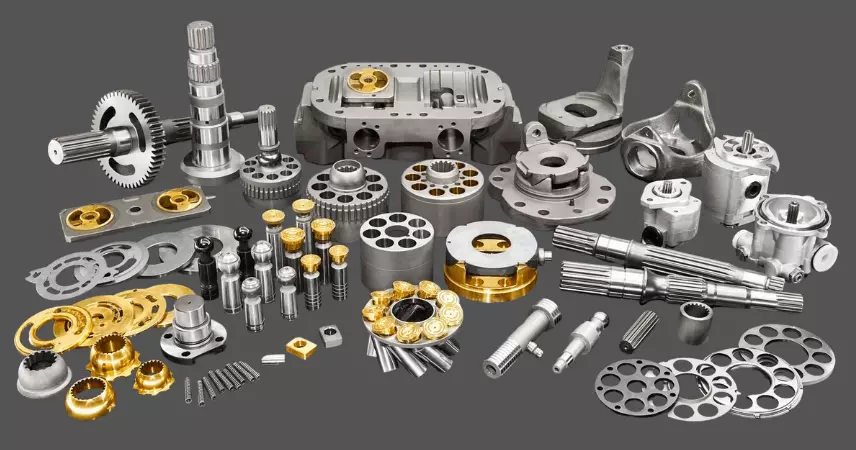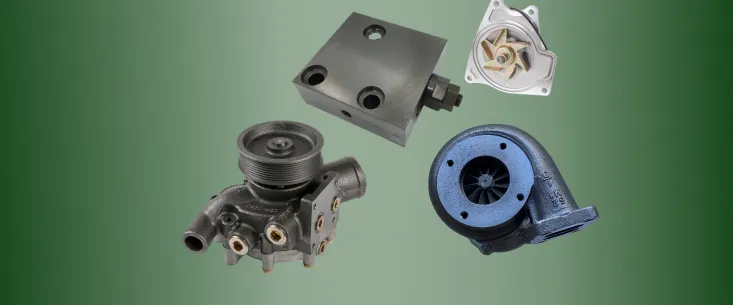+86-135 3388 0668
Hydraulic pumps: The Backbone of Industry

Hydraulic pumps are crucial to modern industrial operations, providing the necessary force to power various systems and equipment. From Construction Machinery to agricultural tools, these powerful devices are designed to convert mechanical energy into hydraulic energy, ensuring smooth and efficient functioning across a wide range of industries.
If you’ve ever wondered how a piece of machinery manages to lift or move heavy loads, you’ve likely encountered the power of hydraulic systems, and by extension, hydraulic pumps. These devices are the driving force behind hydraulic motors, presses, and numerous other industrial applications.

When searching for "hydraulic pumps near me," it’s important to understand the sheer variety of options and applications that exist. Whether you are in need of a pump for an automotive repair shop, a construction site, or a manufacturing facility, choosing the right hydraulic pump is paramount. In this guide, we’ll explore what hydraulic pumps are, the different types available, and how to select the ideal one for your specific needs.
What Are Hydraulic Pumps?
At their core, hydraulic pumps are mechanical devices designed to move fluid within a hydraulic system. Their primary function is to generate flow by pressurizing the fluid, which is then used to power equipment such as cylinders, motors, and other machinery. The fluid – typically oil – is forced through tubes, hoses, or pipes to the desired component, where it’s used to perform a task such as lifting, pressing, or turning.
Hydraulic pumps work on the principle of displacement. The more fluid a pump can move within a given time, the higher the flow rate and the more powerful the system becomes. This characteristic makes hydraulic pumps a popular choice for heavy-duty applications.
When you start searching for hydraulic pumps near you, one of the first things you’ll notice is that there are many types to choose from. Here are some of the most common ones:
Gear pumps: These are some of the simplest and most widely used hydraulic pumps. They use gears to move fluid and are known for their reliability and low cost. However, they are best suited for applications requiring low to medium pressure.
Vane Pumps: A vane pump uses a rotor with sliding vanes to push fluid through the system. Vane pumps are versatile and efficient, making them suitable for a variety of applications. They can handle medium to high pressures and are quieter than gear pumps.
Piston Pumps: These pumps use pistons to push the fluid through a system. Piston pumps are capable of delivering high flow rates and can handle very high pressures. They are typically used in demanding industrial applications such as mining, construction, and manufacturing.
Axial Piston Pumps: A subtype of piston pumps, axial piston pumps are known for their ability to deliver high efficiency and power in both low and high-speed operations. They’re often used in mobile equipment, including excavators and loaders.
Radial Piston Pumps: These pumps are characterized by pistons arranged radially around a central drive shaft. Radial piston pumps are typically found in heavy machinery where high torque and consistent power delivery are required.
Why Choose Hydraulic Pumps Near You?
When it comes to sourcing hydraulic pumps, proximity can be a major factor in your decision-making process. Having a local supplier for hydraulic pumps offers several advantages. Let’s explore some of the reasons why opting for hydraulic pumps near you can be beneficial:
Faster Delivery Times: When you need a hydraulic pump quickly, having a local supplier means less waiting time for shipping and delivery. This can be crucial for operations that rely on hydraulic pumps for continuous operations.
Personalized Service: Local suppliers tend to offer more personalized services. From consultations to customizations, they are often more flexible in meeting your specific needs and can provide expert advice on selecting the right pump for your application.
Cost Savings: Depending on your location, sourcing a hydraulic pump from a nearby supplier can help reduce transportation and shipping costs. This could translate into significant savings, especially for bulk purchases.
Maintenance and Support: If your hydraulic pump ever requires servicing, having a local supplier ensures that you have quick access to maintenance and repair services. This can help extend the lifespan of your equipment and reduce downtime.
Community and Networking Opportunities: Local suppliers are often well-connected within their industries. Purchasing from them can create opportunities for networking and partnerships that may benefit your business in the long run.
Choosing the Right Hydraulic Pump for Your Needs
When it comes to selecting the right hydraulic pump for your specific application, several factors need to be considered:
Flow Rate: One of the first considerations when choosing a hydraulic pump is the flow rate, which determines how much fluid the pump can move per unit of time. This is typically measured in gallons per minute (GPM) or liters per minute (LPM). The required flow rate depends on the type of machinery you’re operating and the level of performance needed.
Pressure Requirements: Another key factor to consider is the pressure that the hydraulic pump must be able to handle. Different pumps are rated for different maximum pressures, so it’s important to select a pump that can handle the demands of your system without compromising performance or safety.
Pump Size and Design: The physical size and design of the hydraulic pump are important considerations, especially if you’re working with space constraints or specific design requirements. Smaller pumps may be ideal for compact machinery, while larger pumps are necessary for heavy-duty industrial applications.
Energy Efficiency: Depending on the scale of your operation, energy efficiency can play a significant role in the total cost of ownership. Pumps that are more efficient at converting mechanical power into hydraulic energy can help lower your operational costs.
Environmental Considerations: In some cases, environmental factors such as temperature, humidity, and the type of fluid used may impact the performance and durability of your pump. Be sure to select a pump that is well-suited for your operating conditions.
As we’ve explored in this section, hydraulic pumps are a vital component in various industries, powering everything from large construction machinery to smaller, specialized tools. Choosing the right hydraulic pump for your application requires careful consideration of factors like flow rate, pressure, size, and efficiency. Additionally, sourcing hydraulic pumps locally can provide numerous benefits, including faster delivery, personalized service, and potential cost savings.
In the next part of this guide, we will dive deeper into the importance of hydraulic pump maintenance, how to troubleshoot common issues, and tips on extending the lifespan of your pump to ensure smooth and reliable operation. Stay tuned!
Maintaining Hydraulic Pumps for Longevity and Performance
While choosing the right hydraulic pump is crucial, maintaining it over time is equally important to ensure its longevity and optimal performance. In this section, we will discuss the steps you can take to maintain your hydraulic pump, troubleshoot common issues, and understand how to maximize the efficiency of your system.
Regular Maintenance Is Key
Like all mechanical systems, hydraulic pumps require routine maintenance to perform at their best. Preventive maintenance is essential to avoid costly repairs and extend the lifespan of the pump. The following are some general maintenance tips for hydraulic pumps:
Check Fluid Levels and Quality: The fluid used in a hydraulic system plays a crucial role in the performance of the pump. It helps lubricate moving parts and carries away heat. Low fluid levels or contaminated fluid can lead to overheating, increased wear, and pump failure. Be sure to check the fluid regularly and replace it as necessary.
Inspect for Leaks: Hydraulic pumps rely on a closed system to function properly. Leaks can lead to loss of pressure, reduced performance, and even system failure. Regularly inspect the pump and surrounding components for any signs of leaks, and address them promptly.
Monitor Temperature: Excessive heat is one of the leading causes of hydraulic pump failure. Ensure that the system is operating within the recommended temperature range. If the pump is running too hot, it may be a sign of issues like excessive friction, inadequate cooling, or low fluid levels.
Clean the System: Over time, dirt and debris can accumulate in the hydraulic system, leading to wear on the pump and other components. It’s essential to keep the system clean and free of contaminants. This includes cleaning the pump housing, filters, and hoses to maintain efficient operation.
Check the Pressure Relief Valve: The pressure relief valve is responsible for preventing the system from becoming over-pressurized. If it’s malfunctioning, the pump could be at risk of damage. Regularly check the valve to ensure it’s functioning correctly.
Troubleshooting Common Hydraulic Pump Issues
Even with regular maintenance, issues can sometimes arise. Some common hydraulic pump problems include:
Low Pressure: If your system is experiencing low pressure, it could be due to a leak, air in the system, or a clogged filter. Check for any visible leaks and inspect the filter to ensure it’s clean. Bleed the system to remove any trapped air.
Excessive Noise: Hydraulic pumps should operate smoothly and quietly. If you hear unusual noises, such as grinding or whining, it could indicate a problem with the bearings, fluid contamination, or cavitation. Address the issue promptly to avoid further damage.
Overheating: Overheating can result from insufficient fluid flow, clogged filters, or high ambient temperatures. Ensure that the fluid levels are correct, and the cooling system is functioning properly. If necessary, install a larger or more efficient cooling system.
Erratic Operation: If the pump is not delivering consistent performance, it could be due to a faulty pressure control valve, pump cavitation, or issues with the fluid. Investigate these components to pinpoint the issue.
Maximizing Hydraulic Pump Efficiency
To get the most out of your hydraulic pump, here are some tips for maximizing efficiency:
Match Pump to Application: Ensure that the hydraulic pump you’ve chosen is appropriately matched to your specific application. Selecting a pump that is too small can lead to poor performance, while choosing one that’s too large can result in wasted energy.
Optimize Fluid Quality: Use the correct fluid for your hydraulic system and keep it clean. The right fluid can improve pump efficiency, reduce wear, and prevent contamination.
Keep Components Well-Maintained: Regularly inspect and replace components such as seals, hoses, and filters to ensure that they’re functioning optimally. A well-maintained system operates more efficiently and reduces the risk of downtime.
Use Variable Speed Drives: In applications where the hydraulic pump doesn’t need to operate at full capacity all the time, consider using variable speed drives (VSDs) to adjust the pump’s speed according to demand. This can improve energy efficiency and reduce wear on the pump.
Hydraulic pumps are indispensable in modern industry, providing the power needed to operate everything from heavy machinery to smaller equipment. By choosing the right hydraulic pump, maintaining it properly, and troubleshooting common issues, you can ensure long-term performance and efficiency. And by sourcing pumps locally, you can benefit from faster delivery, personalized service, and cost savings.
Incorporating these tips into your daily operations will help you maintain a reliable and cost-effective hydraulic system, keeping your equipment running smoothly and your business thriving.
Search
Blog & News